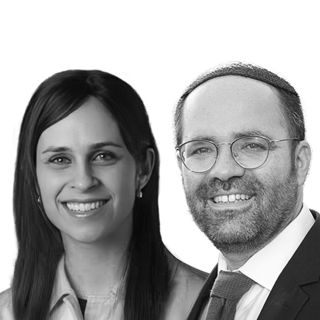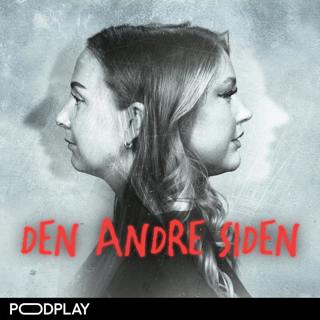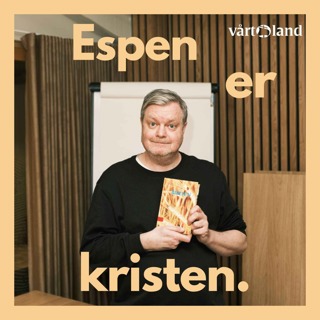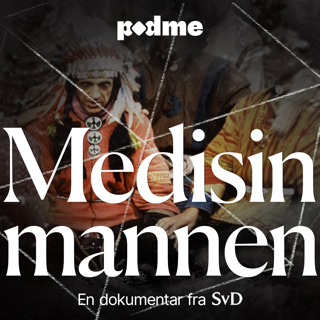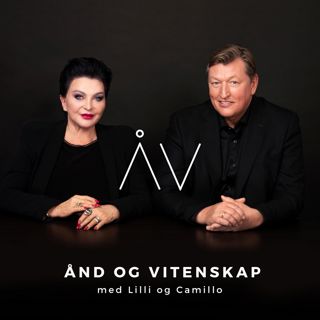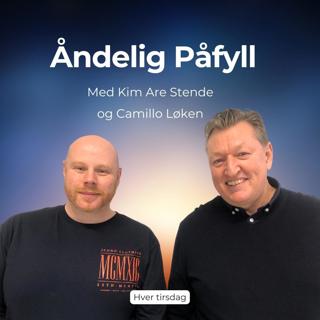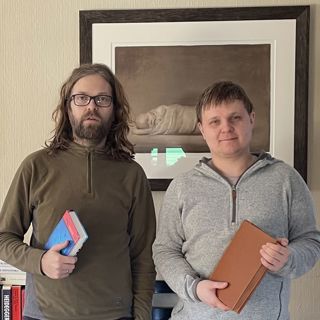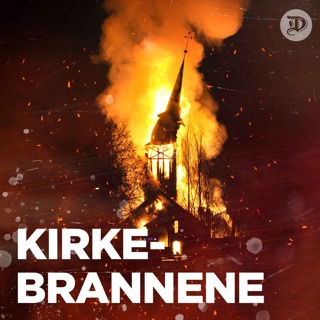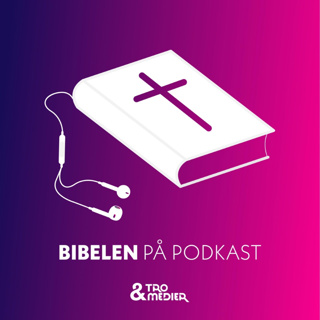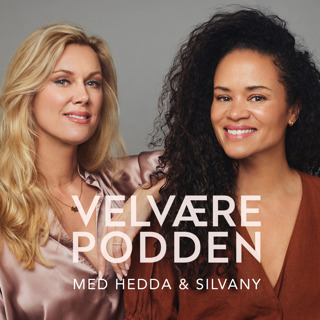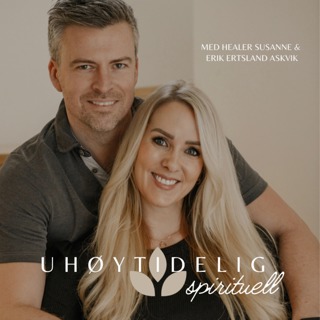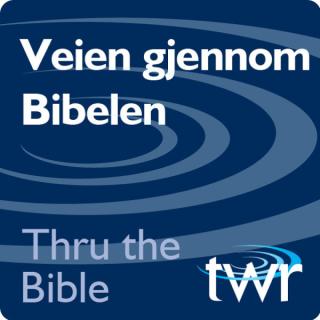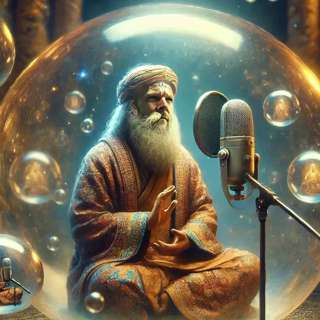![Rav Moshe Weinberger: Can Mysticism Become a Community? [Mysticism 3/3]](https://cdn.podme.com/podcast-images/D79089FBEF78B78B9B1A2A8AFD27F6A1_small.jpg)
Rav Moshe Weinberger: Can Mysticism Become a Community? [Mysticism 3/3]
In this episode of the 18Forty Podcast, we sit down with Rav Moshe Weinberger, rabbi and educator, to discuss the role of mysticism in modern-day Judaism. Rav Weinberger grew up Modern Orthodox and became attracted to Chassidus at a young age. Though he is a fan of the yeshiva system and believes that Halakha cannot be compromised, he has long watched with anguish as countless products of the system have been turned off by the dry, inhumane version of Yiddishkeit taught to them. Rav Weinberger believes that Jewish education must evolve over time, and that Chassidus is as good an approach as any for the current generation. -How can one go about strengthening their connection to Hashem?-What are the educational challenges of today’s generation?-Where does the modern-day yeshiva system succeed, and where does it fail its students?-And how can we attempt to tweak the system to suit everyone’s needs?Tune in to hear Rav Moshe Weinberger discuss the challenges that he sees facing today’s generation of young Jews. For more, visit https://18forty.org/mysticism/#weinberger.Become a supporter of this podcast: https://www.spreaker.com/podcast/18forty-podcast--4344730/support.
3 Nov 20201h 12min
![Dr. Ora Wiskind: How do you Read a Mystical Text? [Mysticism 2/3]](https://cdn.podme.com/podcast-images/D79089FBEF78B78B9B1A2A8AFD27F6A1_small.jpg)
Dr. Ora Wiskind: How do you Read a Mystical Text? [Mysticism 2/3]
In this episode of the 18Forty Podcast, we sit down with Dr. Ora Wiskind, professor and author, to discuss her life journey, both as a Jew and as an academic, and her attitude towards mysticism.Ora grew up in a Reform family in Ohio, receiving a top-notch secular education but a minimal Jewish one. After studying in France and Germany she found herself in Israel, eventually becoming Orthodox despite her rebellious nature. With her background in literature, she has contributed unique, hermeneutic perspectives on some Hasidic masters, like Rebbe Nachman of Breslov, and continues to break new ground with her scholarship on mysticism.-What are mysticism and rationalism, and what are the appeals of both mindsets?-How did someone with Ora’s background end up writing about the mystical works of Rebbe Nachman?-How has her background in literature influenced her writings?-How does she approach her work as a religious academic, where she must stay objective about the content she studies despite it giving her religious inspiration?-And how has being an Orthodox woman shaped her career?Tune in to hear Ora Wiskind discuss mysticism in the modern world and its relation to her academic work.For more, visit https://18forty.org/mysticism/#wiskind.Become a supporter of this podcast: https://www.spreaker.com/podcast/18forty-podcast--4344730/support.
27 Okt 20201h 5min
![Joey Rosenfeld: Can Mysticism Heal Us? [Mysticism 1/3]](https://cdn.podme.com/podcast-images/D79089FBEF78B78B9B1A2A8AFD27F6A1_small.jpg)
Joey Rosenfeld: Can Mysticism Heal Us? [Mysticism 1/3]
In this episode of the 18Forty Podcast, we sit down with Joey Rosenfeld, social worker and kabbalist, to talk about the differences between mysticism and rationalism and the roles they should play in our lives. Mysticism is often misunderstood and dismissed by rationalists without much thought, but what is mysticism? One might define it by what it’s not: reductionism, which combined with complexity is science. But what if we saw things as their whole instead of their constituent parts? Maybe we’re limiting ourselves by reducing the big picture to a list of atomic components; maybe seeing the unfiltered unity in all things would be freeing. Joey Rosenfeld began to learn Kabbalah in depth in yeshiva, when he was supposed to be dedicating his time to Talmud, and found its ideas to be profoundly life-changing. He does not fit the stereotype of the secluded, white-bearded mystic, as he is a social worker and addiction counselor. As someone with a unique window into people’s vulnerabilities, Joey sees deep connections between Kabbalah and psychology, particularly in the theory behind Alcoholics Anonymous, which drew from the work of Carl Jung. -What are the differences between rationalism and mysticism?-Are they compatible or incompatible?-What approach should people take when learning Kabbalah?-Are there parallels between mysticism and therapy?-And how is or isn’t mysticism suited for a modern audience?Tune in to hear Joey discuss the role that mysticism plays in his life, and how one can find peace in transcending rationality. For more, visit https://18forty.org/mysticism/#rosenfeld.Become a supporter of this podcast: https://www.spreaker.com/podcast/18forty-podcast--4344730/support.
20 Okt 20201h 24min
![Samuel G. Freedman: Can Jew vs. Jew Ever Become Jew with Jew? [Peoplehood 4/4]](https://cdn.podme.com/podcast-images/D79089FBEF78B78B9B1A2A8AFD27F6A1_small.jpg)
Samuel G. Freedman: Can Jew vs. Jew Ever Become Jew with Jew? [Peoplehood 4/4]
In this episode of the 18Forty Podcast, we sit down with Professor of Journalism at Columbia and author, Samuel G. Freedman, to talk about dissent not as a cause of ugliness and divide, but of beauty and unity. Some would say that disagreement isn’t a bug of the Jewish community, but a feature. We have a rich history of debate in the Talmud and haven’t been able to shake this dubious quality even in the modern day United States. The internet has only exaggerated this, and while one can argue for the benefits of dissent, the fact that Jews seem embroiled in a perpetual state of debate remains. -Is debate a healthy state of mind for our community?-Should we be looking to avoid debate or embrace it?-Does dissent cause only divide or can it be used as a means of understanding the other members of our community?Tune in to hear Samuel discuss the roles that individual Jews play in the larger debate that is the Jewish community. For more, visit https://18forty.org/peoplehood/#freedmanBecome a supporter of this podcast: https://www.spreaker.com/podcast/18forty-podcast--4344730/support.
29 Sep 202045min
![Bethany S. Mandel: Jews without Community [Peoplehood 3/4]](https://cdn.podme.com/podcast-images/D79089FBEF78B78B9B1A2A8AFD27F6A1_small.jpg)
Bethany S. Mandel: Jews without Community [Peoplehood 3/4]
In this episode of the 18Forty Podcast, we sit down with conservative journalist and cultural commentator, Bethany S. Mandel, to talk about the entrances and exits of her life, reconstructing Jewish identity, and creating a Jewish home outside of the Jewish community. Bethany has written for the New York Times and Washington Post, and now serves as an opinion columnist for the Forward, a contributor to the Washington Examiner's Beyond the Beltway blog, and is an editor at Richocet.com. She is a sharp writer and speaker about Jewish communal life, particularly about conversion, and has written about the impact of the Freundel affair on her life. -Can one be a member of the Jewish community while living outside the institutions that constitute the community?-Can you love Judaism, but not Jews?-How does one deal with disappointment in Judaism, particularly at the hands of a Jewish leader?-How can we build reconciliation and create a more empathetic community?Tune in to hear Bethany discuss the relationship between Jews and the Jewish community, and why her Jewish community is her home. For more, visit https://18forty.org/peoplehood/#mandelBecome a supporter of this podcast: https://www.spreaker.com/podcast/18forty-podcast--4344730/support.
22 Sep 202043min
![Laura E. Adkins: Is There Room for All Opinions? [Peoplehood 2/4]](https://cdn.podme.com/podcast-images/D79089FBEF78B78B9B1A2A8AFD27F6A1_small.jpg)
Laura E. Adkins: Is There Room for All Opinions? [Peoplehood 2/4]
In this episode of the 18Forty Podcast, we sit down with Laura E. Adkins, the JTA’s opinion editor and an adjunct professor of journalism at Stern College for Women, to talk about how she stays grounded while engaging with so many disparate viewpoints. Many people live in a perpetual bubble, never allowing themselves to step too far from the lifestyle they feel is comfortable. They may only ever engage with straw man versions of others’ opinions, and therefore may never be exposed to a diversity of ideas and people. As a seasoned journalist - currently the opinion editor of the internationally-syndicated Jewish Telegraphic Agency - Laura is no stranger to subversive opinions and pluralistic attitudes. She is also a baalas teshuva, having forged her Jewish identity by the force of her own will. -How has she been able to stay grounded and centered in her identity as a person while engaging with so many different people and opinions?-How has her experience as a baalas teshuva contributed to this?-What was her journey as a baalas teshuva like?-How do groundedness and a plurality of opinions and information play a role in modern kiruv (Jewish outreach)?-And how should they play a role?Tune in to hear Laura reflect on her journey as a baalas teshuva, the state of kiruv, and the art of remaining true to one’s identity. For more, visit https://18Forty.org/peoplehood/#adkinsBecome a supporter of this podcast: https://www.spreaker.com/podcast/18forty-podcast--4344730/support.
15 Sep 202046min
![Rav Aaron Lopiansky: What Tribes do you Contain Inside? [Peoplehood 1/4]](https://cdn.podme.com/podcast-images/D79089FBEF78B78B9B1A2A8AFD27F6A1_small.jpg)
Rav Aaron Lopiansky: What Tribes do you Contain Inside? [Peoplehood 1/4]
In this episode of the 18Forty Podcast, we sit down with Rav Aaron Lopiansky, Rosh HaYeshiva of the Yeshiva of Greater Washington, to talk about the challenges facing American Orthodoxy, life-long education, and value education.Rav Lopiansky speaks the language of the particular; much of his insight is situated for those in the Yeshiva-oriented Jewish communities, but his thought is important for all. As he navigates his understanding of the many roles we all occupy, he promotes a loving acceptance of diversity within the community, with the goal of appreciation for the whole Jewish people. -How can one person love a whole nation?-How can the love for a nation be a textured love, an appreciation that runs deeper than ethnocentrism or love of the similar?-Can deep engagement with one’s own cultural experience engender a deeper appreciation for other cultures?-Or do the lines of difference between one’s culture and others demand demarcation?Tune in to hear Rav Lopiansky discuss differentiating education for all ages, the challenges facing the Jewish people in 2020, and his thoughtful commentary on Jewish life today. For more, visit https://18forty.org/peoplehood/#lopiansky.Become a supporter of this podcast: https://www.spreaker.com/podcast/18forty-podcast--4344730/support.
10 Sep 20201h 17min
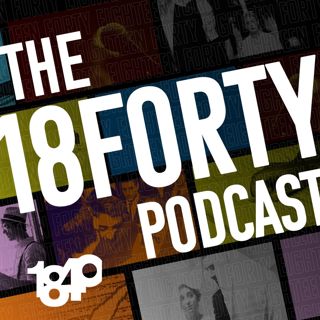
Reflections Four Months After Launch
18Forty launched in May 2020 and since then we’ve explored Talmud, OTD: Leaving Religion, Comedy, and Biblical Criticism. As we take a two-week break before exploring our next topic, we want to spend some time reflecting on what we’ve learned.Learn more at https://18forty.org/Become a supporter of this podcast: https://www.spreaker.com/podcast/18forty-podcast--4344730/support.
25 Aug 20201h
